7.3 Spot Welds and Braze Joints
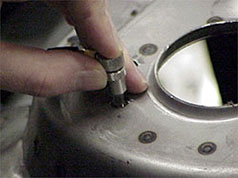
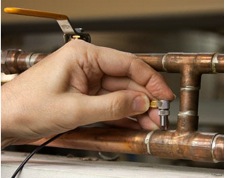
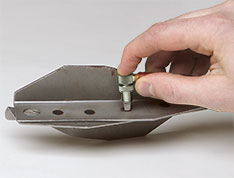
Spot welding is a common technique for joining two pieces of metal, usually thin sheets or plates, by means of a series of small circular tack joints approximately 2.5 mm to 6.5 mm (0.100” to 0.250”) in diameter. The process is widely used in the automotive industry for body assembly and some chassis joints, and by other types of sheet metal fabricators such as appliance and metal furniture makers as well. Spot welds are commonly tested with small, high frequency delay line transducers (typically 15 MHz or 20 MHz) with elements whose diameter approximates that of the weld.
The most commonly encountered problems with spot welds are lack of fusion, an undersized nugget, or a stick weld (fused by mechanically weak due to poor nugget formation). These conditions can be identified through comparison of echo patterns with the pattern of multiple echoes obtained from a good weld of similar geometry.
Brazing is a common process for joining sections of small diameter metal tubing and certain other small metal parts such as electrical contacts. It bonds two pieces of metal by means of a metallic filler that is melted and then flowed into the space between them by capillary attraction. Braze joints are typically tested by means of a straight beam test that monitors the amplitude of the echo from the inside surface of the outer metal part. Small diameter delay line transducers are commonly used. In the case of a good braze joint at the test point, the metal-to-metal bond will return a relatively small reflection, while an air gap will return a much larger one. These levels are established in each case by setting up on samples representing know brazed and un-brazed conditions. The example below shows a test of a 12.5 mm (0.5”) copper tubing braze using a 20 MHz delay line transducer. The gate marks the joint depth. If there is fusion the echo at that point is very small, and if there is no fusion it is large.
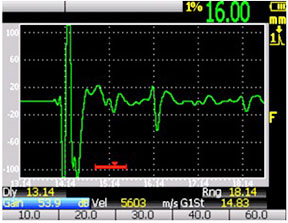 | 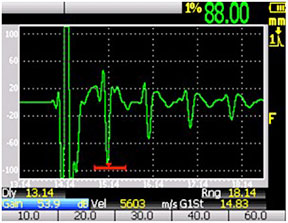 |
| Braze present, small echo in gate | No fusion, large echo in gate |